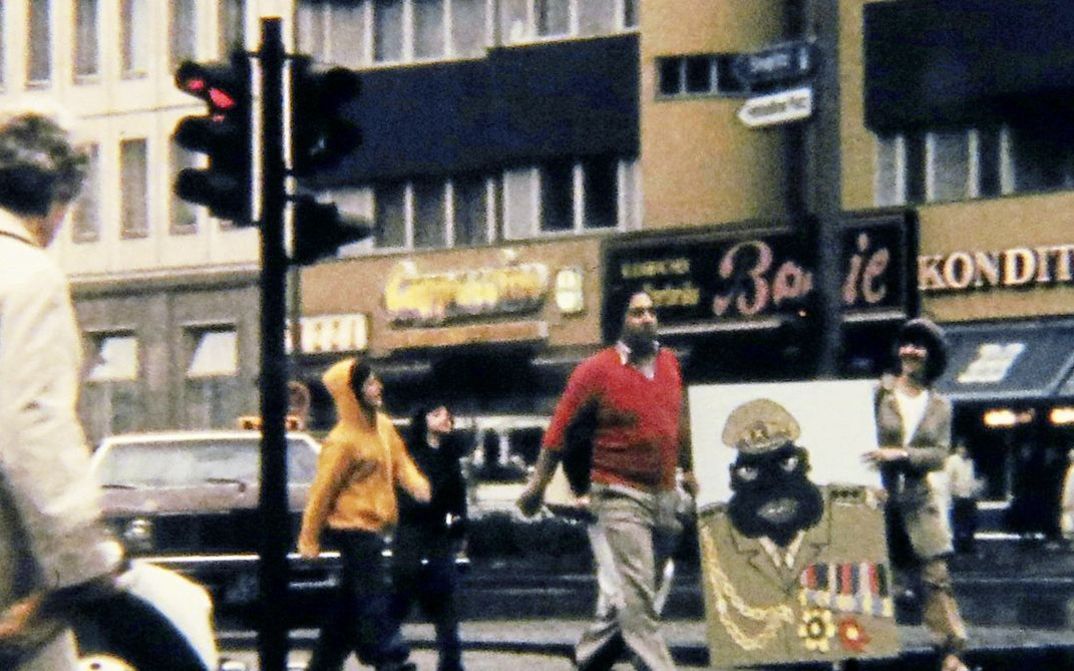Fiktionsbescheinung Program 3

Fri 17.02.
15:00
Cinema
Arsenal 1
The „Fiktionsbescheinigung“ explores the question of how culture in general and cinema in particular are related to society and racism. It is dedicated to the work of Black directors and directors of colour in Germany and sees itself as an experiment in shared curatorial responsibility that also seeks to shine a spotlight on a chapter of German film production that has been unfairly neglected.
The film selection was put together by curators Karina Griffith, Jacqueline Nsiah and Can Sungu, supported by Enoka Ayemba and Biene Pilavci and the Berlinale Forum selection committee.
Director
Antonio Skármeta
Federal Republic of Germany / 1978
12 min.
/ 16 mm
Original language
German, Spanish
Summer in West Berlin, in the late 70s. Exiles from all over the world are dancing in the Tiergarten or playing football in front of the Bellevue Palace. They go to the municipal office and have their residence permits extended by a grumpy official; the passports are stamped in rhythmic fashion. They see their children’s photos in the passports and their children today, years older. A poem by Pablo Neruda is heard in voiceover: “Exile is round in shape/A circle, a ring./Your feet go in circles,/You cross land/And it is not your land.” They draw pictures of dictators on the way out on cardboard: Idi Amin of Uganda, Dimitrios Ioannidis of Greece, the Shah of Persia, General Franco of Spain and António Salazar of Portugal. When they hug their friends at Tegel airport who are travelling back to where they grew up, their joy knows no bounds.
But one dictator hasn’t been toppled yet. Augusto Pinochet’s military junta is still oppressing the filmmaker's home country of Chile. He is already being carried through the streets of West Berlin as a cardboard cut-out though, a defiant hope to be fulfilled in 1990. (Cristina Nord)
Director
Safi Faye
Federal Republic of Germany, Senegal / 1980
59 min.
/ Original version with English subtitles
Original language
German, French
By the time she produced MAN SA YAY for German television in 1980, Senegalese auteur Safi Faye had already honed her skills through an impressive suite of projects that reflect on life in her home nation.
Effortlessly fluid in style, weaving together fiction, non-fiction, the essayistic and the epistolary, the film follows Moussa, a young student at Berlin’s Technische Universität. While he does connect with friends and lovers, he is primarily seen alone, working odd jobs, cooking or tidying his apartment. At home is where he reads the letters from family members and his partner in Senegal which structure the film.
At once the centre of the film and a conduit for other lived experiences, Moussa serves to reflect and refract two distinct constellations of social connections. We learn of his loved ones in Senegal (including their wish lists of consumer goods from Europe). Such experiences and desires are mirrored by the sequences of his friends, other West African expatriates making due by hawking “African artifacts” on the street. In each case, we hear the repeated question, laden with longing in some cases, pitched as thinly veiled microaggression elsewhere: “When will you return?” (Jesse Cumming)